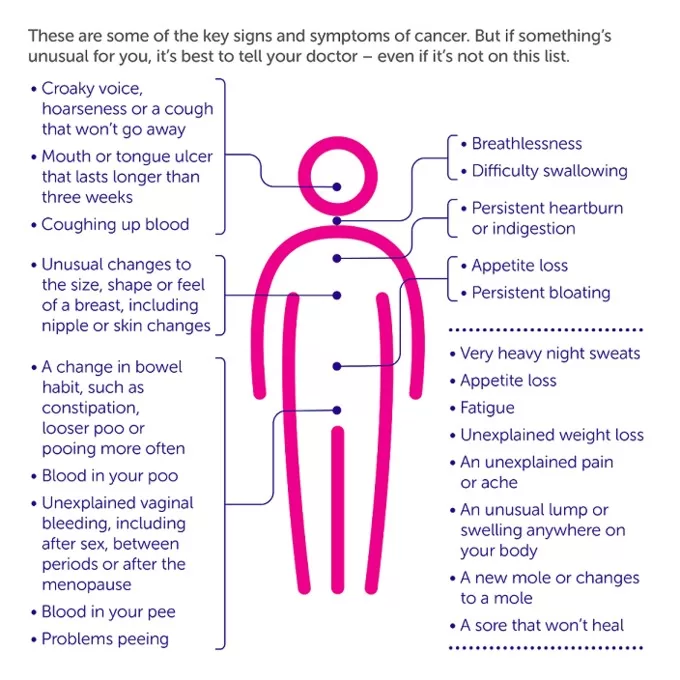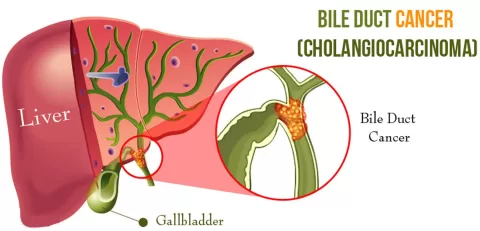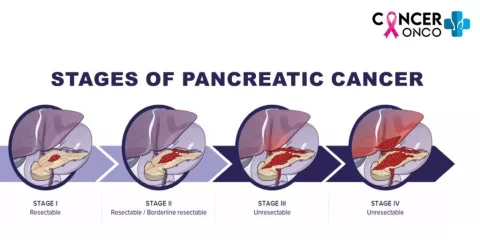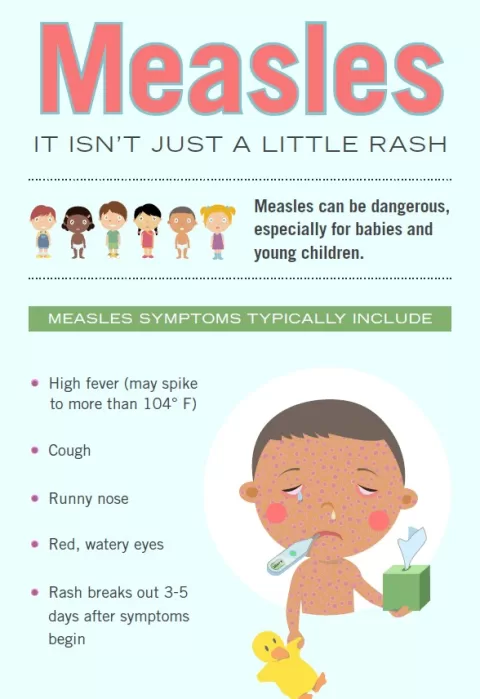Recognizing the early signs of cancer is a crucial step in improving your chances of survival. Symptoms such as unusual fatigue, unexplained weight changes, and persistent pain could be indicators of potential health issues, including cancer. Early detection of cancer through health screenings can lead to more effective treatments and significantly better outcomes. Being proactive and aware of cancer risk factors helps you take charge of your health and potentially prevent cancer from developing. Don’t overlook these warning signals; understanding cancer symptoms can truly save lives.
The initial symptoms indicating the presence of malignancy can often be subtle, making it essential to stay informed about bodily changes. Identifying potential signs of tumors, such as persistent pain or digestive disturbances, is a necessary step toward early intervention. Health professionals emphasize the importance of regular screenings in catching these diseases in their infancy. By understanding these health indicators and your risk factors, you can engage in preventative measures that might curb disease progression. Awareness and timely action can significantly alter the course of your health journey.
Understanding the Early Signs of Cancer
Recognizing the early signs of cancer is essential in increasing the chances of effective treatment and survival. Symptoms such as unexplained weight loss, persistent fatigue, or a nagging cough can be warning signals that something is wrong. These signs usually develop over time, so it’s crucial to remain vigilant and monitor any inexplicable changes in your health. Despite being common symptoms, when they persist or disrupt your daily life, they become especially important and warrant a consultation with a healthcare professional.
Moreover, many people often dismiss mild or intermittent symptoms, thinking they are insignificant. However, being proactive about these early signs can lead to timely diagnoses. Regular health screenings and consultations are recommended for individuals, especially those over the age of 50. Awareness and education about these early warning signs empower individuals to take charge of their health and seek medical advice early on.
The Importance of Health Screening for Cancer
Health screening plays a crucial role in the early detection of cancer, particularly in cases where symptoms are not apparent. Public health initiatives encourage regular screenings based on age, family history, and risk factors. For example, breast cancer screening through mammography is recommended for women starting at age 50, while men are advised to begin prostate screenings based on individual risk. These screenings help detect cancers at a stage when they are most treatable, significantly improving outcomes.
Furthermore, participatory screening programs not only assist in the early detection of cancer but also educate the public about potential symptoms and risk factors. Understanding that certain cancers grow with minimal or no symptoms underscores the importance of these preventive measures. Regular health screenings, combined with awareness of your body’s warning signs, are vital strategies in the fight against cancer.
Identifying Cancer Symptoms Early
Many people are unaware of the symptoms that could signal the onset of cancer. For instance, subtle changes in bodily functions, like a persistent cough, unexplained bruising, or difficulty swallowing, might indicate an underlying health issue. It’s essential to stay informed about these indicators as they can lead to breakthroughs in early detection. Engaging in conversations with healthcare providers about any new symptoms can lead to early interventions, potentially saving lives.
Additionally, educating oneself about specific cancer symptoms and understanding one’s risk factors is a proactive step everyone can take. Regular discussions about your health with family, friends, and health professionals can create a support network that encourages vigilance and proactive health management. The recognition of symptoms and risk factors is critical—each individual must feel empowered to act when potential health issues arise.
The Role of Blood Tests in Cancer Detection
Blood tests serve as an invaluable tool in cancer detection, offering insights into bodily health that can lead to early diagnoses. Tests measuring tumor markers can indicate the presence of certain cancers even before symptoms develop. For instance, elevated levels of PSA can suggest prostate cancer, while abnormal CA 125 levels may indicate ovarian cancer. These blood tests are particularly crucial for individuals at higher risk due to age or family history, making them an essential component of routine health check-ups.
Moreover, advancements in medical technology are enabling blood tests to become more precise and reliable in medical diagnostics. This evolution allows for earlier interventions, which can save lives. It’s imperative for individuals to engage in conversations about the appropriate timing and types of tests they should consider, especially if they exhibit early signs of cancer or have a family history of the disease.
Lifestyle Changes to Prevent Cancer
Adopting a healthier lifestyle is one of the most effective ways to lower your cancer risk. Research indicates that lifestyle factors like diet, physical activity, and substance use significantly influence cancer prevalence. Incorporating a diet rich in fruits and vegetables, limiting processed foods, and engaging in regular exercise can dramatically reduce cancer risk factors. These changes not only promote overall health but also enhance the body’s natural defenses against cancer.
Additionally, eliminating smoking, limiting alcohol consumption, and practicing sun safety are critical aspects of cancer prevention. By making informed choices, individuals can take charge of their health and make strides towards preventing cancer. Prevention strategies should not be overlooked; they are crucial for early detection and combating the disease effectively. Understanding lifestyle’s impact on health paves the way for a healthier, cancer-free future.
Recognizing Urgent Cancer Symptoms
Urgent cancer symptoms should never be dismissed, as they could signify a more serious underlying condition. Blood in urine or stools, radical changes in bowel habits, or sudden, unexplained weight loss are all signals that merit immediate attention from a healthcare provider. These symptoms can be indicators of various types of cancer and highlight the need for immediate exploration and, if necessary, further testing to rule out serious health issues.
Staying informed about these urgent signs is vital for timely intervention. If you or someone you know experiences persistent and concerning symptoms, prompt medical evaluation is imperative. Being proactive can lead to early detection, which is often the key to successful cancer treatment. Thus, encouraging open discussions about health concerns is vital for community awareness and early action.
Empowering Yourself Through Cancer Education
Education is a powerful tool in the fight against cancer. Understanding cancer risk factors, identifying symptoms, and being aware of available screenings empower individuals to take control of their health. Community programs that provide education on cancer awareness are crucial in helping people recognize the importance of early detection. Knowledge helps in demystifying cancer, reducing stigma, and encouraging more individuals to seek help when necessary.
Moreover, shared knowledge fosters a supportive network that can guide individuals through preventative measures and encourage regular check-ups. Hosting workshops and community discussions about cancer can significantly enhance public understanding. The more informed people are about cancer, the better equipped they become to prevent it and aid in early detection, ultimately contributing to improved health outcomes.
The Impact of Family History on Cancer Risk
Family history is a significant factor in assessing one’s cancer risk. Certain cancers exhibit hereditary patterns, where genetic predispositions increase the likelihood of developing the disease. Individuals with a detailed understanding of their family medical histories can discuss screening strategies with their healthcare providers that are tailored to their level of risk. This information can prompt earlier screening and more aggressive preventive measures that could be lifesaving.
Being proactive about family history allows individuals to not only get screened at appropriate intervals but also promote awareness within families. Shared knowledge about hereditary cancers can lead to more informed life choices regarding lifestyle changes and screening habits. Addressing family history openly can help create a culture of health awareness that prioritizes proactive measures against cancer.
Navigating Support Resources for Cancer Awareness
Finding the right support resources is crucial for those who are navigating cancer awareness. Many organizations offer educational resources, counseling, and support groups for individuals affected by cancer. Engaging in these communities fosters resilience and collective learning, enabling individuals and families to confront potential cancer journeys with knowledge and support. Awareness campaigns aimed at educating the public about early signs of cancer can also empower people to take their health seriously.
In addition, many online platforms provide extensive information about specific cancers, treatment options, and local screening programs. Utilizing these resources can help demystify the cancer detection process and encourage individuals to seek help when symptoms arise. Building a network of support can significantly influence how one navigates health crises, making education about resources an integral part of overall cancer awareness.
Frequently Asked Questions
What are the early signs of cancer to watch for?
Early signs of cancer can often be subtle but are crucial for early detection. Key symptoms to recognize include persistent pain that doesn’t respond to treatment, ongoing digestive issues like diarrhea or constipation, frequent urinary problems, unexplained bleeding, and unexplained shortness of breath. Other general symptoms include unusual fatigue, unexpected weight changes, and excessive night sweating. If you notice any of these symptoms, consult a healthcare professional for proper examination.
How can early detection of cancer improve treatment outcomes?
Early detection of cancer significantly improves treatment outcomes. When cancer is identified in its initial stages, there are more treatment options available, and it is often more manageable. Regular health screenings and being aware of early signs of cancer, such as unusual changes in your body, can lead to timely interventions and potentially save lives by catching the disease before it progresses.
What role does health screening for cancer play in preventing cancer?
Health screening for cancer is pivotal in preventing cancer as it allows for the early detection of the disease, even before symptoms arise. Screening programs, such as mammograms for breast cancer or colonoscopies for colorectal cancer, help identify at-risk individuals and initiate prompt treatment. Regular screenings increase the chance of detecting cancer early when it’s more treatable, potentially reducing mortality rates associated with the disease.
What are the common cancer risk factors to be aware of?
Common cancer risk factors include age, genetics, lifestyle choices, and environmental exposures. Factors like smoking and excessive alcohol consumption significantly heighten the risk of developing various cancers. Additionally, being overweight or obese, having a poor diet lacking in fruits and vegetables, and failing to protect your skin from the sun are controllable risk factors that can influence cancer risk. Awareness and management of these factors can aid in cancer prevention.
How do blood tests contribute to the early detection of cancer?
Blood tests contribute to the early detection of cancer by identifying abnormal levels of certain tumor markers, which can indicate the presence of cancer. For example, PSA levels can suggest prostate cancer, while CA 125 can be associated with ovarian cancer. While blood tests alone cannot diagnose cancer, they serve as a useful screening tool, prompting further investigation when abnormalities are detected. Regular blood tests should be part of a proactive health monitoring routine, especially for individuals with known risk factors.
| Key Points | Details |
|---|---|
| Impact of Cancer in France | Cancer is one of the leading causes of death in France; hundreds of thousands of new cases are diagnosed each year. |
| Importance of Early Detection | Recognizing early signs of cancer can save lives and lead to more effective treatments. |
| Warning Signs of Cancer | 1. Persistent pain, 2. Ongoing digestive issues, 3. Frequent urinary problems, 4. Unexplained bleeding, 5. Shortness of breath, 6. Unusual fatigue, 7. Unexpected weight changes, 8. Excessive night sweating. |
| Screening Programs | Breast: Mammography (50-74 years), Colorectal: Fecal Test (50-74 years), Cervical: Pap Smear (25-65 years). |
| Role of Blood Tests | Blood tests can identify abnormal markers indicating potential cancers, such as PSA, AFP, and CA 125. |
| Prevention Measures | 1. Quit smoking, 2. Limit alcohol, 3. Healthy diet, 4. Regular exercise, 5. Maintain healthy weight, 6. Skin protection from sun. |
Summary
Early signs of cancer are crucial indicators for seeking timely medical attention. Recognizing and acting upon these symptoms can significantly enhance the chances of successful treatment and recovery. Understanding the warning signs, participating in recommended screening programs, and embracing proactive lifestyle changes can empower individuals to reduce their cancer risk and improve health outcomes. It is essential to remain vigilant and consult healthcare professionals whenever noticeable symptoms arise.
The content provided on this blog (e.g., symptom descriptions, health tips, or general advice) is for informational purposes only and is not a substitute for professional medical advice, diagnosis, or treatment. Always seek the guidance of your physician or other qualified healthcare provider with any questions you may have regarding a medical condition. Never disregard professional medical advice or delay seeking it because of something you have read on this website. If you believe you may have a medical emergency, call your doctor or emergency services immediately. Reliance on any information provided by this blog is solely at your own risk.








